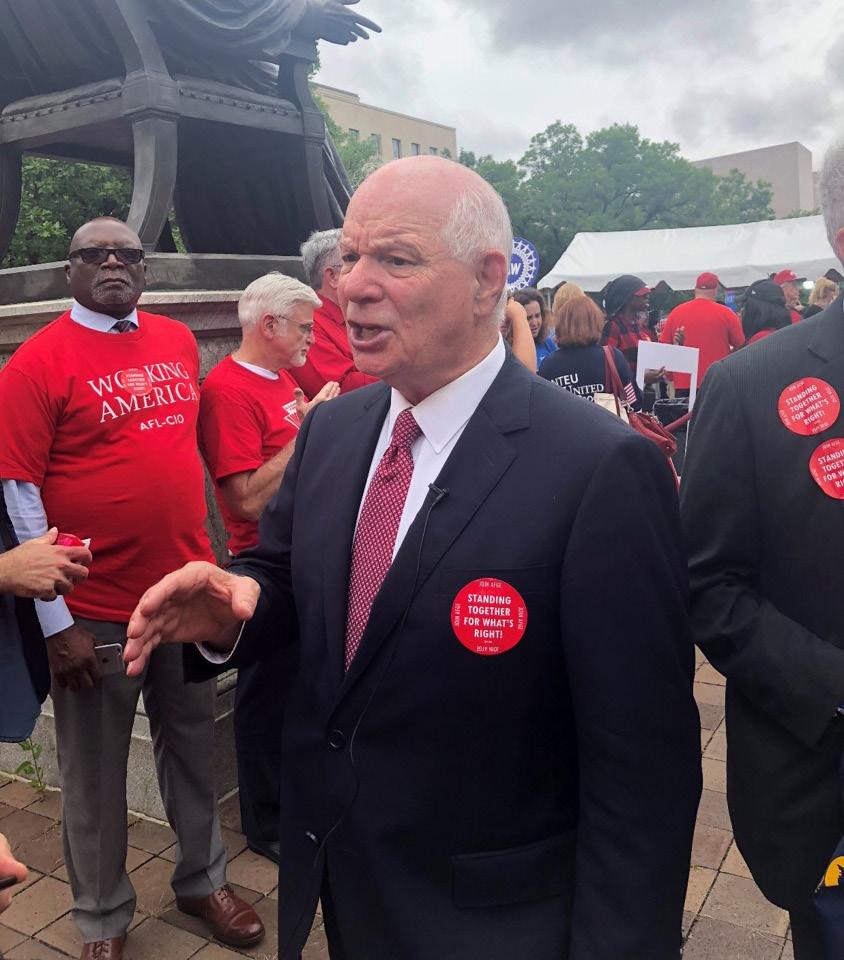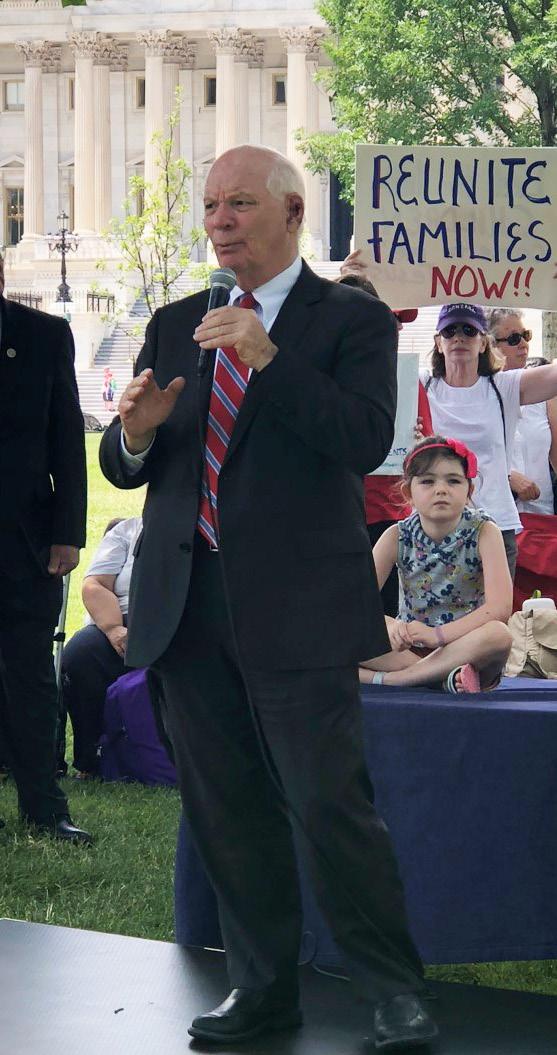
10 minute read
An Interview with Senator Ben Cardin
The MSBA continuously engages with members of local, state and federal government, including the Governor's office, State and Federal Judiciary, our Legislators in Annapolis, and Senators and Representatives in Congress. In that vein, in June, then MSBA President, Dana O. Williams, Esq., chatted with Senator Ben Cardin in a virtual setting to learn more about the Senator, his legal career, and his role in helping small businesses, including law firms, in the wake of the COVID-19 pandemic.
Dana Williams: You have been a friend of the Maryland State Bar Association and, specifically, the many causes we champion like access to justice, funding legal representation for homeless veterans and many others. Why are these issues so important to you?
Ben Cardin: It goes back to my law school days when it was instilled upon me that as a lawyer you really are charged with access to our legal system and the ability of our legal system to help all. That’s been a value that I’ve held strongly. So, when the opportunity presented itself for me to chair the Maryland Legal Services Corporation, I took on that challenge, and I saw firsthand just how many people in our state were not getting access to justice. That’s [ just] not right. As a lawyer, as a custodian of our legal system, I felt an obligation to try to do something about that. So we had a commission that looked into the legal services and one of their recommendations was to institute a clinical program in our law schools. I was very proud to have [the clinical program] implemented under Governor Schaefer. To me it really does instill upon lawyers their responsibility to make sure our system is accessible to all.
DW: The Maryland business community, large and small - as you know a lot of our lawyers are also small business owners - will need a robust federal response to help it recover from the COVID-19 pandemic. You've done great work delivering for Maryland in the past, what areas are you focusing on or anticipate focusing on to assist in that recovery?
BC: Well, as you know, the Congress passed the CARES Act. Part of the CARES Act was to [address the COVID-19 pandemic and] to deal with individual needs, including unemployment insurance and checks from the IRS, [and] dealing with our state and local government and their needs. The part that I was directly involved with was to help small businesses, and it's interesting most law firms are small businesses. The truth is that during this pandemic they're all hurting, and that in order to keep small businesses afloat we had to provide dramatic help. I was proud to be part of a group of four senators that crafted what's known as the Paycheck Protection Program (PPP) that provided substantial help to now over 4 million small businesses in our country, including a lot of professional associations, so that they could weather the storm, stay afloat and be ready when our economy returns.
We're going to have to do more, we're going to have to help make sure that our economy is performing at a level when we are able to get past [this pandemic]. We have to adjust to the new realities. I intend to be very actively engaged in the United States Senate to make that transition as productive and smooth as possible.
DW: We are living in, shall we say a polarized time? As a matter of fact, I think the country is in pain right now to some degree. What message would you share with the members of Maryland's legal community around what they can do to be helpful in this climate?
BC: All of us can make a difference. I just urge lawyers to be active, be actively engaged in the bar association, be actively engaged in your community, you can make a difference. I've always felt that what you do in pro bono, you're making a difference in an individual person's life by your service to our community.
If you're unhappy about how things are going, get involved and try to change them. Do what Martin Luther King told us to do, and that is each one of us is here for a reason. We can make a difference in someone's lives, but when we join together we can bring about change. I just urge individuals, members of the bar, do what you can on your own, but join other people of like minds, so that we can make sure that we preserve the democratic institutions of this country, [and] the rule of law of this country. As attorneys, we should be proud to be the guardians of our legal system, [and] these values.

DW: Switching gears, any fond memories of the lawyering world?
BC: Thinking back on my law school days, they really taught me to be prepared for anything. I got married in my first year of law school. Every one of my professors knew I was getting married over Thanksgiving break. We took a honeymoon, and I showed up to my classes on Monday, and every single professor called on me first. It taught me an important lesson, that you've got to be prepared for anything in life. That's being a lawyer, you have to be able to deal with whatever is thrown at you. To me, it's been a great skill for me as a legislator and a United States Senator. The hardest decision I ever had to make in my life was to run for the House of Representatives, because I knew that by running for the House of Representatives, I would no longer be able to practice law, and I love practicing law. To me, one of the great decisions I made in my life was to become a lawyer.
DW: That’s a great story, and is consistent with a lot of other law school professor stories I’ve heard.

DW: As an apolitical organization, the MSBA is interested in diverse perspectives. How have you found working with colleagues from across the aisle during these turbulent times?
BC: Well, first of all, I love being a legislator. I've been a legislator for a long time. Obviously, people have different views. Sometimes they go according to party lines. Sometimes it might just be a philosophical difference. Sometimes it's a geographical difference. But that's what makes legislating so challenging and so rewarding, [bringing] people together to get results [and] get things done. So I am proud that I worked, for example, with the late Senator McCain on human rights issues, and we are able to establish a global standard on human rights. More recently, I've worked with Senator Rubio, who is a chairman of the Small Business Committee. The two of us worked to get a $600 billion program passed on a bipartisan basis on the Paycheck Protection Program.
I've worked with so many Republican Senators, in order to get things done, I worked with Senator Portman, a Republican from Ohio to get important pension legislation enacted. My message is that part of being a legislator is to figure out ways that you can reach people with different views, whether those views are based upon where you happen to live or your background or your party affiliation. We want to get things done for the benefit of people that we represent, the people of this nation. If you understand that you have a limited amount of time as a representative and you want to get things done, use that time wisely, and make friends with people who may not agree with you on all issues.

DW: Since many law firms received PPP funding, what can we expect for the looming efforts to have recipients seek forgiveness?
BC: Just recently, we made a modification to the program. When it was enacted, you had to spend the money over an eight week period in order to get maximum forgiveness. We've now changed that to 24 weeks. I worked again with my counterparts on the Republican side of the aisle to make that a reality as quickly as possible, and that now has passed the Congress.
[Unfortunately], that's not going to be enough. When we passed the bill, we thought in eight weeks our economy would be back, performing at a level that would not need government assistance, but that's not the case. We're now looking at what the next round will look like. What I am trying to do is to make sure that in this next round, we deal with those small businesses that really need the help. Originally, we wanted to get money out quickly, and we did that in order to preserve small businesses. Now I hope that we'll look at those small businesses that are the smaller of the small businesses, those that have had dramatic revenue reductions, and those that are in traditionally underserved communities and target our assistance to help those small businesses in need.
DW: What should our members be aware of that they may not be hearing in news of coming out of Washington?
BC: I think most people feel that all we do in Washington is fight amongst ourselves, and that we don't like each other and that it's dysfunctional. I serve on the U.S. Helsinki Commission, I've been chairman and Ranking Member of it, and the commission works on human rights globally. It's interesting how many parliamentarians from other countries have come to me and said “we want to see how you do things in the United States because you have the best system in the world.” I think we do have the best system in the world. I think we have the strongest democracy in the world. It's been tested, I must tell you under this current administration, but it is a system that really does respect different views and respects the fact that we are going to fight to preserve American values. That's what brings us together in Washington.
Yes, we'll have our fights, we'll have our partisan divisions, but the members of the Senate, the members of the House are there because they believe in our system, and they want to do good for our country. We work more together than apart. As I said, earlier, I've made friends with Republicans on so many different issues. I was told when I was first elected to the House of Representatives, by then the Majority Leader Dick Gephardt, that if you want to get things done, find a Republican and become friends with a Republican. That's how you get things accomplished, and that's very true. You get things done by listening to other people and being willing to compromise, and that happens every day in the United States Congress.
DW: That is my list of questions. Is there any other wisdom that you would like to pass on to our members today? I did want to thank you for your time today. I want to thank you for your leadership because we need leadership right now because the country is being challenged. You are one of those leaders, and I know you’re working hard for the best of our citizens.
BC: Thank you for that. I just want to tell you, I'm a proud member of the Maryland State Bar Association, and I thank you for what you do for our lawyers. It is an incredible responsibility being an attorney, and I just cherish my education and I cherish the relationships I've had in Maryland.










